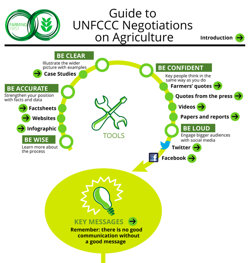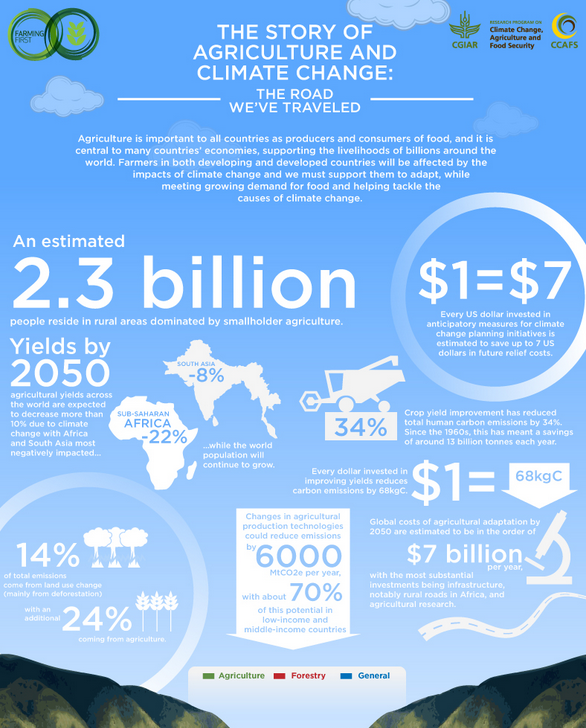Farming First, the CGIAR Research Program on Climate Change, Agriculture and Food Security (CCAFS) and the Technical Centre for Agricultural and Rural Cooperation (CTA) have launched an updated guide to UNFCCC negotiations on agriculture and climate change, ahead of the Bonn Climate Change conference next week.
The Subsidiary Body on Scientific and Technological Advice (SBSTA), a specialist body within the United Nations Framework Convention on Climate Change, will be considering the latest scientific knowledge on agriculture’s role in climate change.
The “Guide to Negotiations on Agriculture and Climate Change” sets out clear evidence for agriculture’s importance to national economies, food security, adaptation and mitigation, as well as guidance on how to engage in the process. The infographic “The Story of Agriculture and Climate Change: The Road We Have Traveled” has also been updated to the present day.
Access “A Guide to Negotiations on Agriculture and Climate Change” at farmingfirst.org/climate
“It is very positive to see Parties committed to work on agriculture under SBSTA for the next two years,” commented Sonja Vermeulen, CCAFS Head of Research. “We want to ensure that any conclusions from this week’s talks on agriculture can inform a new global climate deal,” she said.
Through the guide, the groups encourage policymakers at a national level to combine food security, adaptation and mitigation rather than keeping the three aspects in separate tracks. They also call for the new Green Climate Fund (GCF) to provide stable, long-term support to adaptation and mitigation in agriculture, ending years of neglect within the United Nations climate talks for the sector.
“Funding has been slow to emerge,” says Michael Michener, Sustainability Policy Director at CropLife International and Farming First spokesperson. “Agriculture would benefit in particular from funds that support linked actions on adaptation, mitigation and current food security. This is why it is important to see agriculture more formally integrated in the climate change negotiations so it can be embedded in all the tools and mechanisms developed to support action on climate change.”
The guide provides dozens of facts and resources that illustrate existing solutions to some of the known challenges of climate change that can be scaled up. These include improved soil and water management practices, better climate information services, and greater access to agricultural resources among women.
“This guide is a very useful and informative tool, and comes at a critical moment,” said Manyewu Mutamba, from the Southern African Confederation of Agricultural Unions. “We have the urgent task of ensuring that a global framework for climate action from 2020 does not shut out agriculture.”
“A Guide to Negotiations on Agriculture and Climate Change” also contains:
- Key messages for engaging with policymakers
- Factsheets featuring the latest climate data
- An up to date history of agriculture in the UNFCCC process
- Frequently Asked Questions
- Useful website, infographics and other creative tools
Access the guide through the Farming First climate portal: farmingfirst.org/climate




